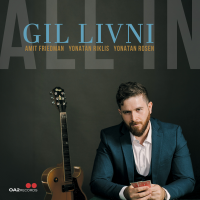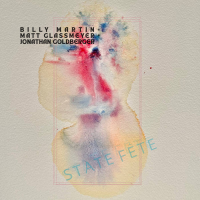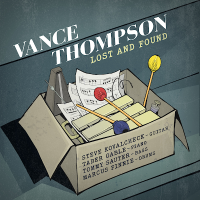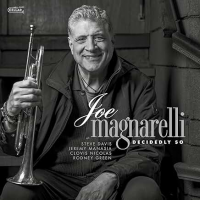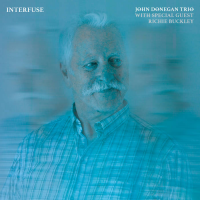Home » Jazz Articles » Multiple Reviews » Seven Slices of Early Lateef
Seven Slices of Early Lateef

Lateef signed a contract with Prestige in late 1957 and his first recording session for the company arrived exactly one day after his last for Savoy. Reconvening the band that was his staple unit for Savoy in the welcoming acoustics of Rudy Van Gelder’s studio Lateef set about subverting the boundaries of bop through the integration Eastern elements on The Sounds of Yusef. Curiously enough given its place as his debut offering, the record sounds the most overtly experimental of his Prestige oeuvre, though the relatively straight opening minutes of Strayhorn’s “Take the “A” Train” seem to suggest otherwise. Gliding atop the mid-tempo rhythm set up by Jackson’s cymbals and Lawson’s economic comping Lateef’s flute sings sweetly through the melody, but takes on a raspy cast in later choruses as its owner vocalizes in a style later popularized by Roland Kirk to create a stream of gently frayed tones. The piece unfolds with measured ease and the effect suggests the ensemble warming up and getting accustomed to the Van Gelder studio surroundings. Lawson and Harden take proficient, if somewhat pedestrian solo turns book ended by a more spirited exchange between Farrow and Jackson. “Playful Flute” once again showcases the lightest wind vessel in Lateef’s instrument satchel, but begins with the leader scraping a coin against a metallic surface to generate a fractured rhythmic pulse. Farrow’s rebob (a one stringed Arabic violin) ekes out a thin ostinato line, and a slew of bells and cymbals stretch a harmonic canopy for mellifluous flute with mixed success. On “Love and Humor” the ensemble’s catechistic fervor veers dangerously close to the precipice of self-parody as Lawson exchanges ivories for the dubious sonics of a blown Seven-Up bottle before eventually joins Harden on balloon chorus. Lateef’s flute is at its most conspicuously Eastern on this one and the somber thematic line succeeds in maintaining an earnest mood. The hard bop harmonies of “Buckingham” return the band to conventional jazz territory in rollicking fashion, while Lateef’s argol crops up briefly on the closing “Meditation” as a coloring device, to the accompaniment of gongs and arco bass. Running time on the record is slight, but as a debut presaging what’s to come with future efforts the enclosed music is well worth hearing.

Lateef’s first Prestige session turned out to be a fruitful one, yielding enough material for his sophomore release, the nebulously titled Other Sounds. Same band and a similar balancing act when it comes to Eastern and Western elements, this time not quite so uniformly successful. “All Alone” initiates the proceedings in a lightly lyrical mood with Lateef blowing velvety tenor and Harden’s warm flugelhorn charting an analogous course through the romance-suffused changes. Lawson and the rest of the rhythm section slide smoothly into a supportive role. With “Anastasia” the band is back in exotic form, employing off rebob and finger cymbals as a backdrop for the pinched phrasings of argol and more diffusively deployed flute. Morphing into a vaguely Latin lit via Jackson’s hand percussion and Harden’s Flamenco brass the tune unfolds as the most compositionally intriguing of the album. Both stretching past the nine-minute mark, “Minor Mood” and “Taboo” continue to supply varied improvisational terrain for the band. The former builds from a bluesy theme and brisk, incessant rhythm as Harden, at his most crisp and focused, and later Lateef on lush-toned tenor, annex the bulk of solo space and swallow up choruses with loquacious hunger that errs near long-windedness. By comparison, Farrow’s bass solo toward the end is refreshing in its frugality. Lateef refashions the latter track, made famous by Exotica high priests like Les Baxter and Martin Denny, into a more authentic jazz vehicle, but retains some of the campy humor through vocal chant that wears its forced ethnicity on its sleeve. The leader’s flute floats along with little of the edge attendant in earlier outings, but Harden’s acrimonious horn injects some much needed heat through a solo that toys intriguingly with tone and pitch. Farrow also has a substantial turn, trading adroitly with the horns and plumbing the bottom tones of his strings. On “Lambert’s Point,” Lateef finds the focus he was missing, blowing tight, beautifully enunciated phrases that mark his finest playing on the disc. But the promise is short-lived as “Mahaba” takes the session out on a weak note, wedding another awkward chant to a set of changes that sound forced in their foreignness.

Two years would elapse before Lateef return to the studio as a leader for Prestige and record Cry!-Tender. The intervening time signaled another shift in his thinking as well as a retooling of his band. Lawson is the only holdover with the fresh faces of Hillyer, Wright and Gant in the roles of trumpet, bass and drums respectively. Though comprised almost evenly of standards and originals the general cast of the program is more conservative. All of the exotic instruments of Lateef’s first two dates, save a brief cameo by argol on “The Snow is Green,” are absent and the arrangements adhere more closely to Western song architectures. “Sea Breeze” wafts along on the languid lope of Wright’s bass and Gant’s sparse percussion. Lateef’s oboe is almost saccharine in its sentimentality and takes some getting used to in tandem with Lawson’s cocktail chords. “Dopolous,” a tune influenced by Lateef’s introduction to Greek Rembetica, opens with some unexpectedly stringent arco work by Wright and settles into an ambling blues feature for Noir-flavored flute and trumpet. Wright’s anchoring line, pregnant with a resonating girth and threaded through the entire piece, is once again a standout. Lateef attacks the title track, a dedicatory piece written during his wife’s illness, on oboe and tenor, extending the melancholy theme in conjunction with Lawson’s simple, but poignant comping. Gant’s rolling toms and swishing brushes further the feeling of tension and unease. The mood lightens with “Butter’s Blues,” a waltz-time piece that provides a melodic feast for Lateef’s voracious tenor. Favoring a full-bodied grainy tone the leader strolls through a long solo after waiting patiently through contrasting statements from each of his partners. Oboe emerges again on the Jerome Kern classic “Yesterdays,” and Lateef stays only slightly from the theme suggesting a reluctance to improvise at length on the double reed. Hillyer’s horn isn’t as shy and he has a brief say before Wright takes the reins in a walking run up and down his strings. The somewhat overwrought preface to “If You Could See Me Now” settles into a plush ballad tempo for the remainder and finds Lateef at his most unabashedly amorous. Bringing up the rear “Ecaps” is credited to pianoless version of Lateef’s earlier band with Harden, but the presence of Lawson seems to suggest otherwise.

Just shy of a year later Lateef was back in the studio as a leader, but this time under the auspices of the Riverside label and in front of a nonet enlisted to realize charts for large ensemble written by himself and two other composers, pianist Kenny Barron, then only seventeen, and Charles Mills, a student of contemporary classicist Aaron Copeland. The result of this collaboration, The Centaur and the Phoenix take shape in a program of music emphasizing an Ellingtonian attention to individual soloists and group dynamics. Added to the compact disc reissue is a pair of tracks taken from an earlier session featuring Lateef with piano trio, percussion and voices. While containing some energetic flute work from the leader they sound quite dated and are strangely akin to the of lounge Exotica performers like Yma Sumac and Enoch Light. The real interest here falls squarely on the large ensemble tracks. Understandably Lateef is the principal soloist and he cycles through his arsenal of instruments with a palpable zeal. What’s most surprising is how fluid and spacious the ensemble sounds given its breadth of voices. Lateef’s throaty tenor guides the action on Barron’s “Revelation” blowing gusty lines and injecting startling reed pops against vamping horns and a propulsive rhythm. Terry’s sultry flugelhorn eases the earlier burn briefly before Houston’s burnished baritone blows followed closely by Fuller’s well-greased slide. Zawinul has a quick spot and the riffing horns take things out in grand style buoying Lateef for a final retort. Lateef’s “Apathy” is anything but impotent, a swing-saturated workout for the composer’s mercurial flute and hard-charging tenor. Williams’ sounds off with stentorian authority in the wake, soon after trailed by the leavening polish of Terry for a series of agile exchanges. Taylor swings convincingly on the unwieldy bassoon and the band crosses the finish in an ascending unison shout. The disc’s centerpiece though is the relentlessly ambitious title track. Not even six minutes in duration, it’s an intricate maze, filled to bursting with contrasting tempos, ingeniously layered harmonies and swirling solo features. Not everything works, but the sheer audacity of the enterprise makes for an always-exhilarating ride. And this leads to the one complaint to be lodged, it’s in the brevity of the pieces. The band and its custom-made compositions could have easily filled a double album (an admitted rarity in the early Sixties) and the arrangements all but beg for such treatment.

Lateef’s Prestige homecoming almost a year later took shape in a date tailored to the exigencies of the label’s Moodsville subsidiary. Ostensibly a commercially friendly forum for jazz artists to interpret standards and original fare in line with the then current mood music craze, the label appears an odd fit for Lateef, at least on the surface. But careful scrutiny of his catalog reveals regular returns to both sentiment-rich material and playing. Even so, Lateef wasn’t about to water down his sound or creativity toward the cause of toeing the commercial line. Eastern Sounds introduces a new rhythm section with Farrow returning to the fold and Harris and Humphries holding down their roles with sensitivity and skill. Once again Lateef and his partners are placed in front of the responsive microphones of Van Gelder’s studio and the results prove memorably cohesive. Fleshing out the program with cleverly scripted originals that stay true to the Moodsville credo while slyly circumventing it Lateef also incorporates a pair of movie themes and a standard. The formerly trite film melodies are recast in beguiling ways; most notably on “Spartacus” where Lateef’s plaintive oboe and Harris’ gilded keys weave around the whisking brushwork of Humphries. The album’s opener “Plum Blossom,” provides purchase for the unique sounds of Lateef’s Chinese globular flute. Constructed of clay and shaped like a grapefruit, the five-note ranged instrument floats dreamily on a sea of strummed rebob, tambourine and subtle piano. Harris’ improvisation on the simple melody is at once stately and playful, while Farrow’s rebob interlude borders on trance inducing in its soothing consistency. “Blues for the Orient” marks Lateef’s most successful oboe outing for Prestige to date. Sounding more comfortable with the double reed he stretches out exploring both pitch and melody variants backed by the cascading press rolls of Humphries’ snare. Harris’ rolls out a bluesy rumination on the theme followed by Farrow on his more familiar strings and the band rounds things off in unision. The bassist is also at the core of “Chinq Miau” a 5/4 cyclic mediation for tenor and ostinato rhythm line. Lateef surges soulfully on top creating contrapuntal tension with searching legato statements against the driving momentum of his sidemen. The tough-bitten tenor play of “Snafu” seems out of place, but it’s a welcome return to Lateef’s roots as he plows through the changes goaded by the insistent push of Farrow and Humphries.

Recorded again at the Van Gelder homestead in Jersey Into Something marked Lateef’s last date for Prestige and predicated yet another juggling of personnel. Harris remained and Wright returned with Jones, on loan from the Coltrane Quartet filling the drum chair. Lateef once again evenly balances originals with standard fare, but pulls a fast one by asking Harris to sit out on three of the numbers. Jones’ polyrhythmic proficiency comes in particularly handy on these tracks, as does Wright’s responsive walking. Where earlier records placed emphasis on oboe and flute, this one favors Lateef’s robust saxophone. But before the mighty reed is uncapped “Rasheed,” written in honor of Lateef’s son, acts as an accommodating canvas for oboe. Harris shapes a Gospel-hued shuffle and Jones carves out an easy beat for the leader to sway above. The pianist takes a breather on “When You’re Smiling” leaving Lateef to dig in on tenor against the shifting rhythms of the Jones as Wright’s rock-steady line holds the tune’s tonal center in a flexible, but robust grip. Harris’ leave extends through “Water Pistol,” another easy swinger that conveys a similar upbeat mood with a slightly faster tempo. Lateef narrows tapers his tenor tone just a sliver, while Wright and Jones increase the rhythmic density in appropriate increments. The closing exchanges between the leader and the drummer are, if anything, even more heated with former raising the bar through some expressive flutter tonguing and forceful over blowing. Throughout the date a barely audible echo dogs Lateef’s saxophone raising the question: was Rudy having an off day? Lateef unsheathes his flute for the run through the bop warhorse “I’ll Remember April,” releasing his supple lines in relatively straight fashion and refraining from his usual vocalizing. Jones’ up a relaxed beat with calypso flourishes and Wright walks right down the middle leaving a trail of rotund notes. Harris takes a walk again on “Koko’s Tune,” another strong tenor sortie that allows for more vigorous dialogue between Lateef and Jones. “P Bouk,” a tune that’s title references the lexicon of a Detroit slang dialect, fits snugly as the album’s capstone. Lateef hoists his tenor one final time and the choruses melt away with a spacious swinging flair. Both Harris and Wright make strong showings and the album ends leaving the lingering desire for more.

Fresh into the New Year and wasting little time, Lateef returned to the Riverside fold to record The Three Faces of Yusef Lateef. The date was a reunion for the leader’s working quartet with Lawson, Wright and Humphries assuming their regular roles. Lateef also chose to enlist Ron Carter’s cello as a guest, perhaps finding inspiration through Eric Dolphy’s recent experiments with Carter in the area of fresh harmonic voicings. The program is an egalitarian mix this time out with two oboe features, three tenor workouts and three flute forays. Emphatic tambourine and arco cello introduce the otherwise easy going “Goin’ Home,” as Lateef plays it mostly safe through the changes, riding out Humphries constant cymbal waves. The unflappable groove spills over into “I’m Just a Lucky So and So” where Carter bowed lines match pitch with Lateef’s nasalized oboe exploration of the melody. Both string players expound through pizzicato solos and Wright taking the low road to Carter’s brittle high bridge fingerings. The blues coat the changes on “Quarantine” via Lateef’s bouncing tenor phrases and the steady strum of Wright’s stout strings. Carter wisely sits this one out and is hardly missed as the quartet draws on the synergy of their past studio associations. Humphries constructs a rare solo in the finishing minutes, sparking a fire atop his snare with blazing sticks and the tune ebbs into silence on a final unison flourish. On the ominous “From Within,” Carter’s dark arco lines blend with those of Wright and the orchestral weight of Humphries tympani to sculpt a backdrop for Lateef’s haunting flute. Lawson eventually enters on delicate celeste, advancing a music box lullaby against the deep rumble of Wright’s corpulent counterpoint. It’s easily the most adventurous track on the disc and presages at the modern Classical tributaries Lateef would explore in coming years. The dour “Salt Water Blues” drags under the overwrought weight of scraping strings and Lateef’s constrictive oboe runs during its opening minutes. But Carter successfully salvages things through a deftly plucked cello interlude and Lawson further cements the piece in a succinct improvisation on the theme. The airy asides of “Adoration” slide uncomfortably close to maudlin sentimentality through feathery flute and a syrupy cello commentary, but again Carter surprises by spurring the group into near dissonant straits during sections of harmonic suspension. Taken together the two sides of Carter make for strange bedfellows and add a curiously avant-garde cast to an otherwise trite performance. An easy swinging take on “Ma- He’s Makin’ Eyes at Me” acts as a sign-off signature for Lateef’s tenor and the band calls it a day.
Lateef spent the next several years as a mainstay in the Cannonball Adderley Sextet, traveling with the band on tours of Europe and the Far East. The band offered a generous forum for his music and a comparatively lucrative salary. Both conspired to keep kept him away from the studio as a leader until the Impulse label came calling in 1963. Lateef rode out the Sixties with Impulse waxing a string of artistically rewarding albums before switching to Atlantic and CTI in the Seventies and Eighties with various sabbaticals for teaching and wood shedding in between, all the while moving in and out of the amorphous boundaries of jazz. In the early Nineties he started his own label YAL as a forum primarily for his own music and began recording at renewed prolific pace. Across the decades and over the course of countless musical travels Lateef has remained true to the fundamentals first elucidated by his early work for Savoy, Prestige and Riverside. Whether deemed successful or not by his audience he’s always placed a premium on personal and creative exploration in his projects, celebrating the world and its cultures as a limitless reservoir of musical ideas. The seeds of this admirable outlook are sown throughout these earliest dates and deserve to be heard by anyone with an ear for the adventurous.
Prestige and Riverside on the web: http://www.fantasyjazz.com
Yusef Lateef – The Sounds of Yusef (Prestige)
Tracks: Take the “A” Train (11:10)/ Playful Flute (4:15)/ Love and Humor (6:08)/ Buckingham (5:06)/ Meditation (4:40).
Players: Yusef Lateef- tenor saxophone, flute, argol, tambourine; Wilbur Harden- flugelhorn, balloon; Hugh Lawson- piano, Turkish finger cymbals, 7-Up bottle, balloon, bells; Ernie Farrow- bass, rebob; Oliver Jackson- drums, Chinese gong, earth-board.
Recorded: October 11, 1957, Hackensack, NJ.
Yusef Lateef – Other Sounds (Prestige)
Tracks: All Alone (5:02)/ Anastasia (4:12)/ Minor Mood (9:32)/ Taboo (9:11)/ Lambert’s Point (4:41)/ Mahaba (3:44).
Players: Yusef Lateef- tenor saxophone, flute, argol; Wilbur Harden- flugelhorn; Hugh Lawson- piano, Turkish finger cymbals; Ernie Farrow- bass, rebob; Oliver Jackson- drums, earth-board.
Recorded: October 11, 1957, Hackensack, NJ.
Yusef Lateef – Cry!-Tender (Prestige)
Tracks: Sea Breeze (3:09)/ Dopolous (3:15)/ Cry!-Tender (5:57)/ Butter Blues (5:41)/ Yesterdays (4:20)/ The Snow is Green (3:10)/ If You Could See Me Now (4:46)/ Ecaps (6:29)*.
Players: Yusef Lateef- tenor saxophone, flute, oboe; Lonnie Hillyer- trumpet; Hugh Lawson- piano; Herman Wright- bass; Frank Gant- drums; Wilbur Harden- flugelhorn*; Ernie Farrow-bass*; Oliver Jackson- drums.*
Recorded: October 16, 1959, Englewood Cliffs, NJ.
Yusef Lateef – The Centaur and the Phoenix (Riverside)
Tracks: Revelation (5:59)/ Apathy (5:20)/ Ev’ry Day (I Fall In Love) (6:55)/ The Centaur and the Phoenix (5:33)/ Iqbal (4:48)/ Summer Song (5:22)/ The Philanthropist (3:56)/ Jungle Fantasy* (2:42)/ Titora* (2:25).
Players: Yusef Lateef- tenor saxophone, oboe, flute, argol; Clark Terry- flugelhorn; Richard Williams- trumpet; Curtis Fuller- trombone; Tate Houston- baritone saxophone; Josea Taylor- bassoon; Joe Zawinul- piano; Ben Tucker- bass; Lex Humphries- drums; Barry Harris- piano*; Ernie Farrow- bass*; Lex Humphries- drums*; Roger Sanders- percussion*; Garvin Masseaux- percussion*; unidentified background voices*.
Recorded: October 4 & 6, 1960 and June 23, 1961*, New York, NY.
Yusef Lateef – Eastern Sounds (Prestige)
Tracks: The Plum Blossom (4:59)/ Blues for the Orient (5:38)/ Chinq Miau (3:17)/ Don’t Blame Me (4:54)/ Love Theme From Spartacus (4:13)/ Snafu (5:40)/ Purple Flower (4:29)/ Love Theme From The Robe (3:59)/ The Three Faces of Balal (2:23).
Players: Yusef Lateef- tenor saxophone, oboe, flute; Barry Harris- piano; Ernie Farrow- bass, rabat; Lex Humphries- drums.
Recorded: September 5, 1961, Englewood Cliffs, NJ.
Yusef Lateef – Into Something (Prestige)
Tracks: Rasheed (5:20)/ When You’re Smiling (4:41)/ Water Pistol (5:36)/ You’ve Changed (4:50)/ I’ll Remember April (6:49)/ Koko’s Tune (6:26)/ P Bouk (7:11).
Players: Yusef Lateef- tenor saxophone, flute, oboe; Barry Harris- piano; Herman Wright- bass; Elvin Jones- drums.
Recorded: December 29, 1961, Englewood Cliffs, NJ.
Yusef Lateef – The Three Faces of... (Prestige)
Tracks: Goin’ Home (5:02)/ I’m Just a Lucky So and So (4:35)/ Quarantine (7:00)/ From Within (4:11)/ Salt Water Blues (6:47)/ Lateef Minor 7th (4:58)/ Adoration (4:31)/ Ma- He’s Makin’ Eyes at Me (4:56).
Players: Yusef Lateef- tenor saxophone, oboe, flute; Ron Carter- cello; Hugh Lawson- piano, celeste; Herman Wright- bass; Lex Humphries- drums, tympani.
Recorded: January 30, 1962, New York, NY.
Tags
PREVIOUS / NEXT
Support All About Jazz
 All About Jazz has been a pillar of jazz since 1995, championing it as an art form and, more importantly, supporting the musicians who make it. Our enduring commitment has made "AAJ" one of the most culturally important websites of its kind, read by hundreds of thousands of fans, musicians and industry figures every month.
All About Jazz has been a pillar of jazz since 1995, championing it as an art form and, more importantly, supporting the musicians who make it. Our enduring commitment has made "AAJ" one of the most culturally important websites of its kind, read by hundreds of thousands of fans, musicians and industry figures every month.








